Do i have a narcissistic mother quiz
Is My Mother a Narcissist?
Having a narcissistic mother can be a nightmare for you because she likes to interfere in your life. They may ruin everything because they think that they can never be wrong. rnA narcissistic mother may want your life to resemble theirs as they always try to compare your choices and actions to the ones they used to make when they were your age. And that can be suffocating and frustrating. So, do you have a narcissistic mother? If yes, take our ‘Is My Mother a Narcissist Quiz’ now.
Questions Excerpt
1. Do you feel loved by your mother?
A. Yes, of course
B. Yes, she dotes on me
C. Sometimes
D. Not really
2. Do you feel like your mother overshadows you?
A. Yes, all the time
B. Sometimes
C. No, not at all
D. She gives me all the space I need because she has her own life
3. Are you happy with the way your mother interacts with your partner/friends?
A. Yes, I've got no problem with it
B. Yes, since we are both very close
C. No, I don't want to make this mistake
D. No, since she never really has the time to meet them
4. Does your mother blame you for things that go wrong in her life?
A. Not at all
B. No, she is not like that
C. Sometimes
D. All the times
5. Are you comfortable with the way your mother talks about you in front of your friends?
A. Yes, why shouldn't I be
B. No
C. Sometimes
D. Yes, most of the time
6. How does your mother react when you tell her about herself?
A. She tries to understand to me
B. Very badly
C. She gets angry
D. She gets sad
7. Do you see your mom as a narcissistic monster?
A. No, because she is too focused on all the people in her life
B. Yes, because she wants to steal my life
C. Yes, because she thinks I need her in my life, while I don't
D. No, she’s the best mother in the world
8. Do you avoid your mother?
A.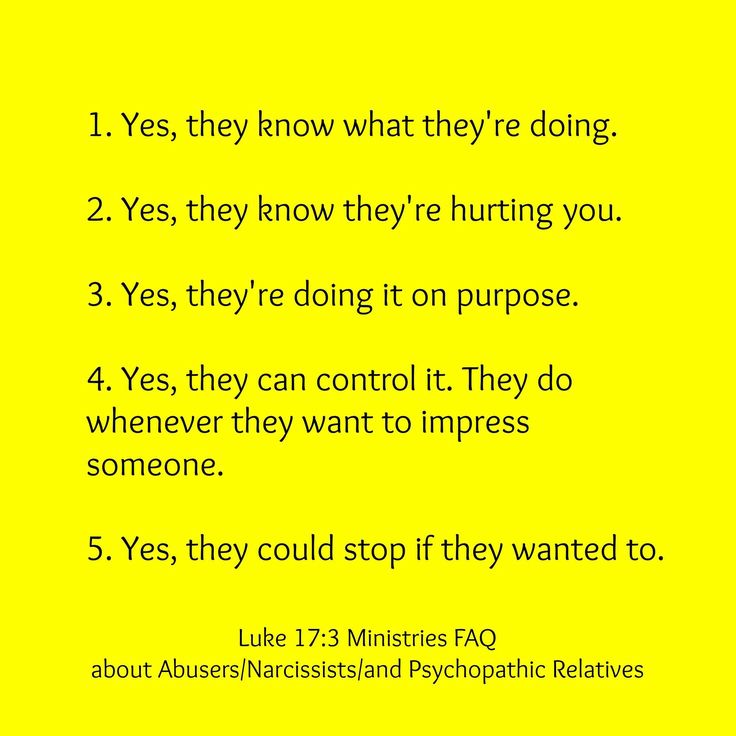 Yes, all the time
Yes, all the time
B. Sometimes
C. No!
D. On rare occasions
9. Does your mother have unrealistic expectations from you?
A. Yes, I think so
B. No, she does not expect anything from me
C. No, not at all
D. Yes, sometimes
10. What are the main things you dislike about your mother’s narcissism?
A. That she enters my conversations uninvited
B. That she is too involved in my life
C. Nothing
D. Not much, because I don't think she's narcissistic
11. How many times does your mother call you every day?
A. Once
B. Twice
C. Three times
D. Four times
12. Did you feel responsible for taking care of your mother?
A. Yes, totally
B. Yes, sometimes
C. Not really
D. No, she always take care of herself
13. Do you feel like your mother likes competing with you?
A. Yes
B. No
C. Sometimes you feel like it but are too afraid to tell her
D. It's possible but you love her too much to see her on that optic
14.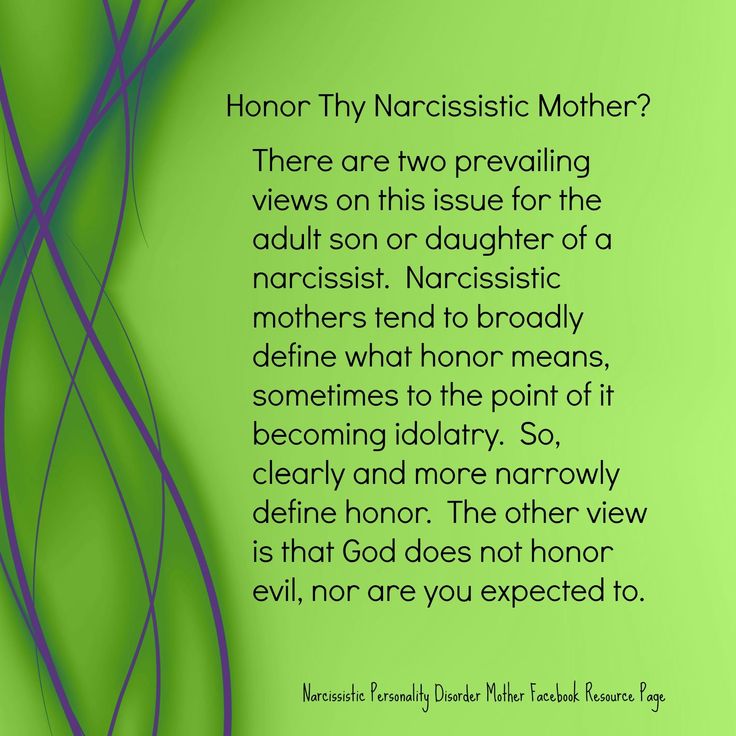 Do you think your mother manipulates you?
Do you think your mother manipulates you?
A. Yes, totally
B. Sometimes
C. She is not manipulative at all
D. She doesn’t waste her time on things like these
15. Do you appreciate your mother’s presence in your life?
A. Yes, a lot
B. Not really
C. I would like to but she invades my space a bit too much
D. Yes, but she just doesn't have enough time for me
Is My Mother A Narcissist Quiz
Who Is The Narcissist?In psychology, narcissism can either be a personality trait – one that is obnoxious yet common – or a rare mental health disorder.
Narcissism As A Mental Health DisorderThe Diagnostic and Statistical Manual of Mental Disorders, Fifth Edition, Text Revision (DSM-5-TR) describes NPD as “A pervasive pattern of grandiosity (in fantasy or behavior), need for admiration, and lack of empathy, beginning by early adulthood and present in a variety of contexts, as indicated by five (or more) of the following”:
1. Has a grandiose sense of self-importance (e.g., exaggerates achievements and talents, expects to be recognized as superior without commensurate achievements).
Has a grandiose sense of self-importance (e.g., exaggerates achievements and talents, expects to be recognized as superior without commensurate achievements).
2. Is preoccupied with fantasies of unlimited success, power, brilliance, beauty, or ideal love.
3. Believes that he or she is “special” and unique and can only be understood by, or should associate with, other special or high-status people (or institutions).
4. Requires excessive admiration.
5. Has a sense of entitlement (i.e., unreasonable expectations of especially favorable treatment or automatic compliance with his or her expectations).
6. Is interpersonally exploitative (i.e., takes advantage of others to achieve his or her own ends).
7. Lacks empathy: is unwilling to recognize or identify with the feelings and needs of others.
8. Is often envious of others or believes that others are envious of him or her.
9. Shows arrogant, haughty behaviors or attitudes.”
Note: Only a licensed professional in the field of mental health can make a diagnosis of any personality disorder, including NPD.
The diagnosis of NPD is rarely given by professionals and fewer people with NPD enter therapy than other groups.
This is mainly because people with NPD function very well in the world using their false self and cannot bear being seen as inferior or inadequate.
Narcissism As A Personality TraitWhen diagnostic criteria for NPD are not satisfied, narcissism can be a personality trait.
Narcissism can be described as a lack of empathy and self-absorption.
Because of their lack of empathy and self-absorption, people with narcissistic traits can be toxic and even abusive.
Related: How To Set Boundaries With Narcissistic Parents?
Narcissistic SupplyNarcissists have an insatiable need for attention and admiration from others.
This attention is often referred to as Narcissistic Supply.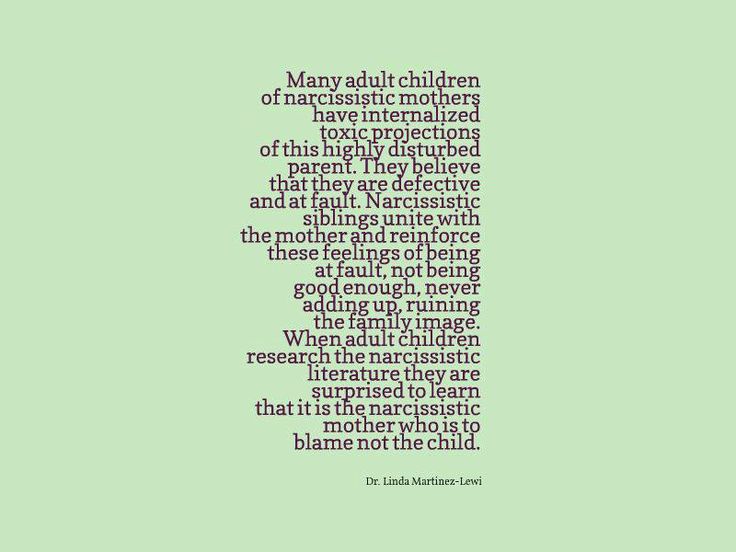 It’s often described as being like a drug for a narcissist. This is why narcissists will do everything to make sure they have their narcissistic supply.
It’s often described as being like a drug for a narcissist. This is why narcissists will do everything to make sure they have their narcissistic supply.
As the daughter of a narcissistic mother, you may have been her narcissistic supply.
Related: Take The Echoist Quiz (The Opposite Of A Narcissist)
Is My Mother A Narcissist QuizThe following questions represent common signs your mother might be a narcissist.
Results
#1. Does she seem like she’s living through you or through one your siblings (e.g., setting expectation not for the benefit of her children, but for the fulfillment of her own needs and dreams)?
Yes
Yes
No
No#2. Does she often put you down so that she remains superior (e.g., rejecting your accomplishments and success, making unfavorable comparisons, etc.
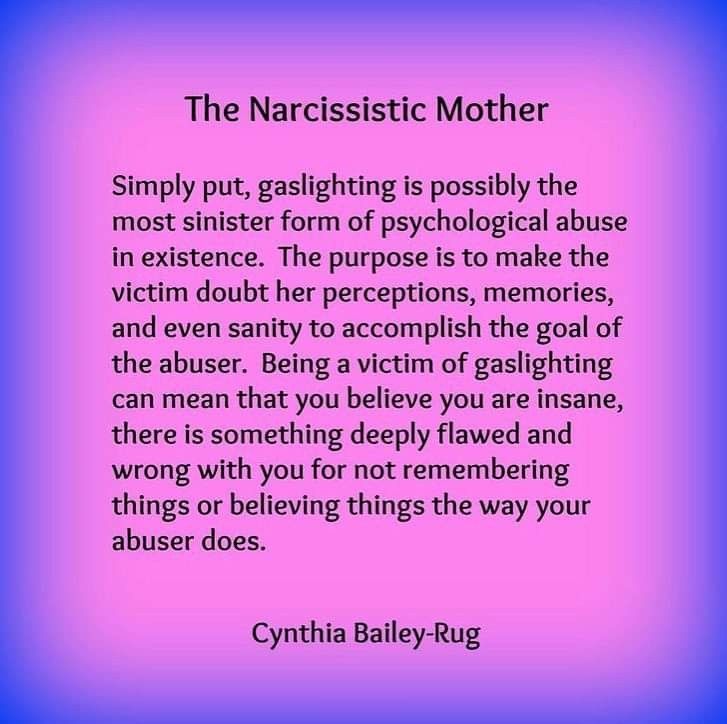 )?
)?
Yes
Yes
No
No#3. Does she often use control and manipulation techniques, such as guilt-tripping, blaming, shaming, negative comparison, etc. to get you to do what she wants?
Yes
Yes
No
No#4. Does she often seem irritated and easily triggered by the smallest reasons (e.g., perceived faults and shortcomings, being in her presence at the wrong time, lack of attention, etc.)?
Yes
Yes
No
No#5. Does she seem jealous and possessive (e.g., doesn’t respect your boundaries, rejects your own romantic partners and friends)?
Yes
Yes
No
No#6.
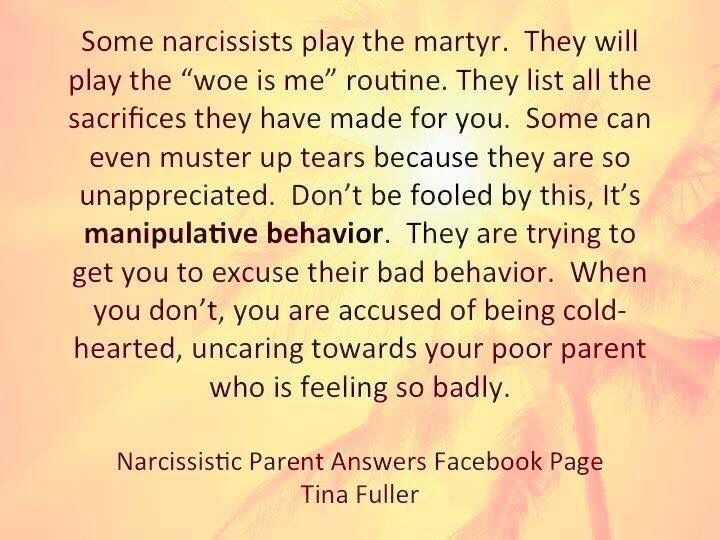 Does she often blame others for her problems and never consider her role in what happens to her, presenting herself as the victim?
Does she often blame others for her problems and never consider her role in what happens to her, presenting herself as the victim?
Yes
Yes
No
No#7. Does she seem to have a falsely inflated self-image that is almost exclusively based on superficial and material trappings?
Yes
Yes
No
No#8. Does she lack empathy (the ability to be mindful of and validate her children’s feelings and thoughts)?
Yes
Yes
No
NoFinish
Note: This test is not meant to act as a substitute for proper assessment.
ResultsThe questions above represent common signs of narcissism. If you answered yes to most of these questions, then your mother might be a narcissist.
If you answered yes to most of these questions, then your mother might be a narcissist.
Being raised by a narcissistic mother can take a severe toll on your mental health and negatively affect every area of your life.
The following are common side effects of growing up with a narcissistic mother:
1. Not Honoring Your Own NeedsAdult children of narcissistic mothers are never taught to consider their own needs and do what’s right for them.
Instead, they’re trained to consider their narcissistic mother’s needs first and foremost.
The idea of listening to their own needs and honoring them fills them with the guilt of being selfish and shame because they don’t feel worthy enough to have or meet their own needs.
2. Internalized GaslightingGaslighting is a form of psychological manipulation that aims to make the victim question their own judgment, perception, and even memory.
For example, your narcissistic mother may deny incidents from the past by saying, “That never happened,” or, “You’re remembering things incorrectly.”
Adult children of narcissistic mothers may grow up doubting their judgment or downplaying their talents and skills. Some people may struggle with imposter syndrome.
Related: How To Heal From A Gaslighting Relationship? 10 Steps To Recover From Gaslighting Effects (& Regain Your Sanity)
3. Feelings of GuiltBeing controlled and manipulated by a narcissistic mother can fill you with feelings of guilt when attempting to leave her or even set a boundary with her.
4. Chronic Self-BlameA narcissistic mother rarely if ever takes responsibility for her own faults and shortcomings. She may even blame others for her own problems.
Many adult children of narcissistic mothers were the scapegoat bearing the blame of their mothers and many internalize the blame and continue to blame themselves even for things they have no control over.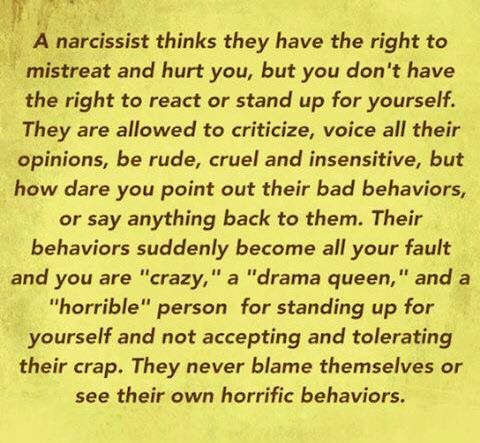
Narcissistic mothers often explode into anger or burst into tears without much warning.
This makes adult children of narcissistic mothers feel like walking on eggshells trying to avoid triggering one of these emotional outbursts, by taking up as little space as possible.
This holds them back from expressing themselves, sharing their thoughts, or risking getting any attention in general.
Related: Undermothered: How to Mother Yourself Using These Practical 10 Strategies?
6. Insecure AttachmentUnhealthy parenting often causes children to develop an insecure attachment style.
Some children become avoidant, and fiercely independent, while others become anxious, codependent, clinging to their mothers for love.
References
- 7 Signs of a Narcissistic Mother & How to Cope (choosingtherapy.com)
- Narcissistic Mothers: The Effects on Their Daughters and How to Heal (psychcentral.
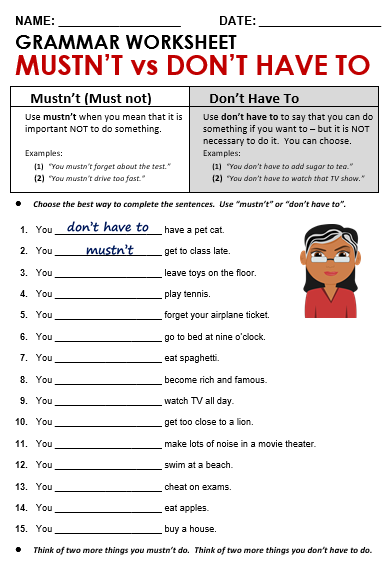 com)
com) - Narcissistic Mother: 12 Signs & Effects On Children (mindbodygreen.com)
- Healing the next generation: an adaptive agent model for the effects of parental narcissism – PMC (nih.gov)
- Narcissistic parent – Wikipedia
- Narcissism Driven by Insecurity, Not Grandiose Sense of Self, New Psychology Research Shows (nyu.edu)
- What New Research Is Telling Us About Narcissism | Psychology Today
- You Probably Think this Paper’s About You: Narcissists’ Perceptions of their Personality and Reputation – PMC (nih.gov)
Why narcissistic mothers are dangerous and how they ruin the lives of their daughters
Reading books about the relationship between mothers and daughters, Dr. Caryl McBride cried every time. She could not understand why she could not remember the feelings of affection and love in her childhood, and she really wanted to find an explanation for this. Thus was born the book Good Enough, in which McBride, based on real stories, explores (for the first time!) the problem of maternal narcissism and its impact on the lives of daughters.
“Both boys and girls suffer from the disruption of emotional bonds when one of the parents is a narcissist. However, the mother also serves as a role model for the growing daughter,” says Caryl McBride.
The narcissist mother pushes her daughter to respond to the world around her in the way she herself does, and not in the way that suits the child. The girl constantly tries to guess the reaction of her mother and adapts to her in order to earn approval and love. Of course, she does not understand that such behavior serves only the interests of the mother.
“Unconditional acceptance of a child as a unique individual is a necessary condition for a girl to grow into a confident woman. If you had a narcissistic mother, you were deprived of that,” McBride writes. The concept of love in daughters of narcissistic mothers is distorted. In childhood, they try to earn the approval of their mother. Their definition of love is to please another without expecting anything in return. This negatively affects the girls' future romantic relationships.
This negatively affects the girls' future romantic relationships.
Moreover, the patterns and narcissistic traits learned in childhood, grown-up girls, becoming mothers, can be transferred to their daughters and reward the next generation of women of their kind with narcissistic traits.
9 characteristics of narcissistic mothers
In everyday life, arrogant people who are obsessed with themselves and their desires are called narcissists. In psychology, narcissism is a spectrum disorder that can manifest itself in many ways, from a few character traits to a full blown narcissistic personality disorder. According to the American Psychiatric Association, approximately one and a half million women in the United States suffer from narcissistic personality disorder.
The Diagnostic and Statistical Handbook of Mental Disorders identifies nine characteristics of narcissistic personalities.
1. Have an inflated sense of self-importance , may exaggerate their achievements and talents, or expect to be recognized as superior in any situation. For example, a mother speaks only about herself, does not ask her daughter questions, is not going to listen to her, but only shares her news and feelings.
For example, a mother speaks only about herself, does not ask her daughter questions, is not going to listen to her, but only shares her news and feelings.
2. Constantly fantasize about limitless success, power, incredible achievement, beauty, or ideal love. For example, a mother earns money by cleaning houses and is sure that her famous clients will help her become famous herself.
3. They believe that they are special and unique , so they can only be understood by people who are just as special or have a high status. The rest are despised. For example, a mother takes the family to a restaurant and treats the waiters like servants.
4. They crave excessive admiration. Example: A mother demands to be thanked, praised and complimented for everything she has ever done for you.
5. They think that everyone owes them. These are unrealistic expectations that other people will treat them especially well or automatically meet their expectations. For example, a mother is sure that she is too important a person to stand in line.
For example, a mother is sure that she is too important a person to stand in line.
6. Exploit others , that is, they use others to achieve their own goals. For example, a mother is friends only with those who can be useful to her.
7. Demonstrate a lack of empathy : unwilling to notice other people's needs or cherish their feelings. For example, a mother constantly points out her daughter's "mistakes", criticizes and humiliates her.
8. Often envious of others or feel that they are the object of envy of others. For example, a mother claims that she has no girlfriends because women are jealous of her.
9. Demonstrate arrogance, arrogance and attitude. For example, a mother thinks that her children are too good and should not play with peers from less wealthy families.
The degree of narcissism can vary. McBride emphasizes that even if your mother doesn't have all nine traits of people with severe narcissistic personality disorder, her narcissism still hurt you.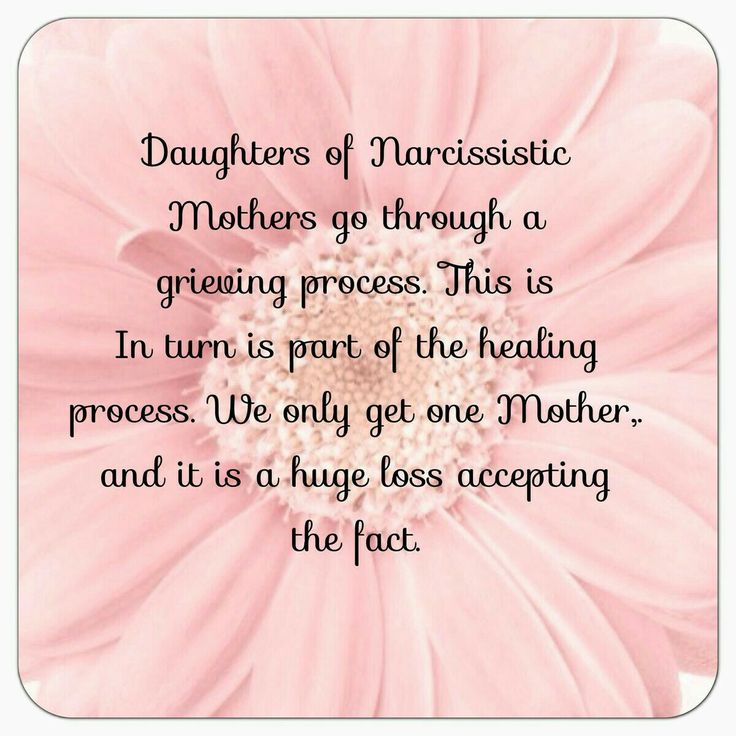 If so, then three destructive mindsets have haunted you throughout your life:
If so, then three destructive mindsets have haunted you throughout your life:
- Something is wrong with me.
- My value is in what I do, not in who I am.
- It's impossible to love me.
10 relationship problems with narcissistic mothers
In her research on maternal narcissism, McBride identified ten common relationship problems between mothers with narcissistic traits and daughters. It doesn't matter if you have experienced all the features in your life or only some of them. This only indicates how clearly narcissism is expressed in the behavior of your mother.
1. You notice that you are constantly trying to win your mother's love, attention, and approval, but fail to please her. Narcissistic mothers are critical and do not accept their daughters as they are.
2. The mother emphasizes that what matters to her is how something looks, and not how you feel about it. Your emotions don't matter to her. She consoles you not with hugs, but with buying new clothes.
She consoles you not with hugs, but with buying new clothes.
3. Your mother is jealous of you: because of your appearance, material well-being, achievements, education, and even because of your relationship with your father.
4. Narcissistic mothers control the interests and activities of their children and do not support their daughters in what they really want.
5. Everything in the family always revolves around the mother. Narcissists do not tolerate rejection and want everyone to obey their wishes.
6. The mother is unable to show empathy. The feelings of a daughter growing up next to her are not taken seriously, and she does not feel her own importance. Regardless of age, such daughters may withdraw, stop talking about themselves, or even notice their feelings.
7. The mother cannot cope with her own emotions. She "stiffens" or "disappears" when it comes to feelings. She does not allow herself or her daughter to express what is in her soul - their relationship is doomed to remain superficial, there is no deep connection in them.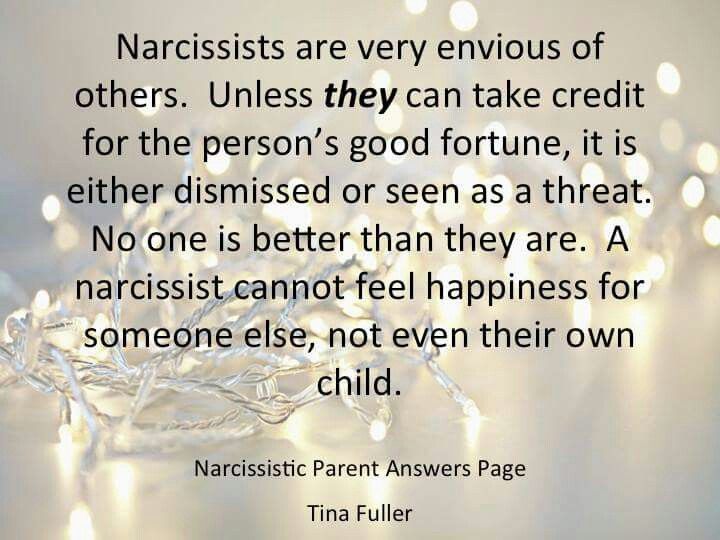
8. Mother often criticizes and condemns. She does it because she doesn't like herself. In this way, she raises her daughters to be extremely sensitive to other people's opinions and makes them constantly feel like they are not good enough.
9. Your mother treats you like a friend, not like a daughter. In a healthy relationship, the mother plays the role of an adult and takes care of the child. Mothers with narcissistic traits did not receive proper care from their parents in childhood, therefore, emotionally, they resemble children who constantly need support.
They often involve their little daughters in the adult world, for example by sharing difficulties with their husband. In this case, the daughter begins to feel loneliness and danger - she does not have a parent to rely on. She feels guilty about not being able to solve her mother's problems and internalizes the "I'm not good enough" mentality.
10. There are no personal boundaries in your communication with your mother. Emotional separation is an essential part of psychological growth, but the narcissistic mother does not allow her daughter to become a separate person. In family life, she has no boundaries, there is nothing personal. For a narcissistic mother, a child is an extension of herself: she can talk to her daughter on the most inappropriate topics, she has the right to interfere in everything and share information with anyone.
Emotional separation is an essential part of psychological growth, but the narcissistic mother does not allow her daughter to become a separate person. In family life, she has no boundaries, there is nothing personal. For a narcissistic mother, a child is an extension of herself: she can talk to her daughter on the most inappropriate topics, she has the right to interfere in everything and share information with anyone.
How narcissism manifests itself: an absorbing and ignoring mother
A mother can only pass on knowledge, confidence and self-love to her daughter if she herself has these skills. Moreover, for this to be successful, a woman must build a deep and balanced relationship with her daughter.
Narcissism is the opposite of balance. In the families of narcissistic mothers, everything is taken to the extreme. “Staying true to intergenerational twisted love, most narcissistic mothers place either too much emphasis on raising their daughters (absorbing mother) or very little (ignoring mother),” McBride writes.
The absorbing mother dominates her daughter with care, dominates every aspect of her life and keeps them under control
She makes all decisions for her daughter and tells her what to wear, how to behave, what to say, think and feel correctly.
Such mothers often seem wonderful. They are involved in the life of their daughters, doing something for them, for them and together with them, so others perceive them as interested parents. Alas, the consequences of such behavior are sad. As a result, daughters have low self-esteem, they often feel their own worthlessness.
An ignoring mother, on the contrary, does not pay enough attention to her child. She does not take or deny the feelings of children seriously. Excluding especially difficult cases, such parents provide the child financially: their own room, food, clothes, but they refuse their daughters upbringing, emotional support and empathy. Therefore, they feel invisible and begin to think that as individuals they do not matter.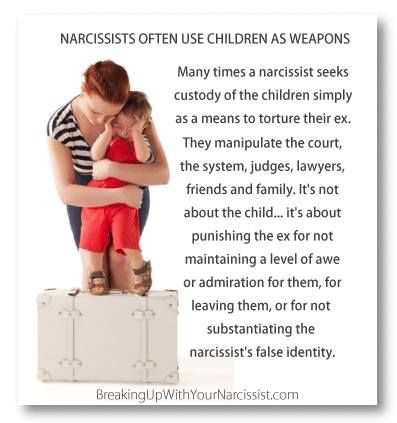
McBride emphasizes that the two styles described are not mutually exclusive. The narcissistic mother can switch from absorbing to ignoring and back again. In addition, she can choose the type of behavior in relation to her daughters: with one daughter, she can be an absorbing mother, and with another, an ignoring one.
Perfectionism and Sabotage: How Children React to Mother's Narcissism
When two daughters are raised by the same narcissistic mother, they often take on very different roles. Both girls think they are loved for what they do, but behave differently. One sister, as it were, says to the narcissistic mother: “OK, I will show you what I am capable of and what I am worthy of.” She becomes a perfectionist who constantly strives to achieve more. Another sister, having adopted the same attitude, begins to believe that everything is meaningless and she will not achieve anything anyway. She goes into passivity and self-sabotage.
As adults, successful daughters seem like superheroes, but their accomplishments and high performance do not bring satisfaction or inner comfort.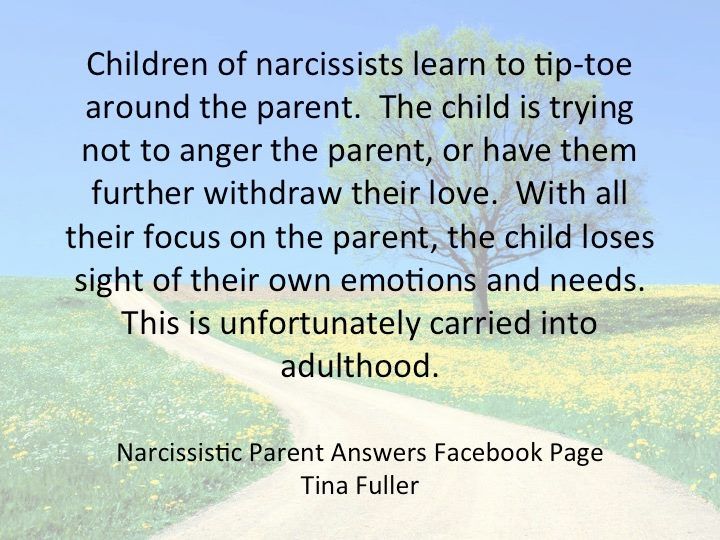
They are constantly struggling with a sense of failure and never notice how much has already been done. They are constantly looking for what else they can do to prove their worth, and often work themselves up to burnout and chronic fatigue syndrome. There are no problems if you are successful, doing what you love, while praising yourself and taking care of yourself.
Alas, many super-successful daughters, suffering from workaholism, cannot slow down, which leads them to health problems. Here's proof that I can't be who you want me to be!" They give up easily, try to numb the pain with addictions, are unable to break free from self-destructive habits, and refuse to realize their potential.
As they get older, these daughters start looking for a replacement mother, someone who can take care of them. They are smart, talented and capable of many things, but they do not believe in themselves. So they find alternative unhealthy ways to get other people to take care of themselves: huddling in the basement of an aunt's house, ending up in jail, or living on welfare or unemployment benefits.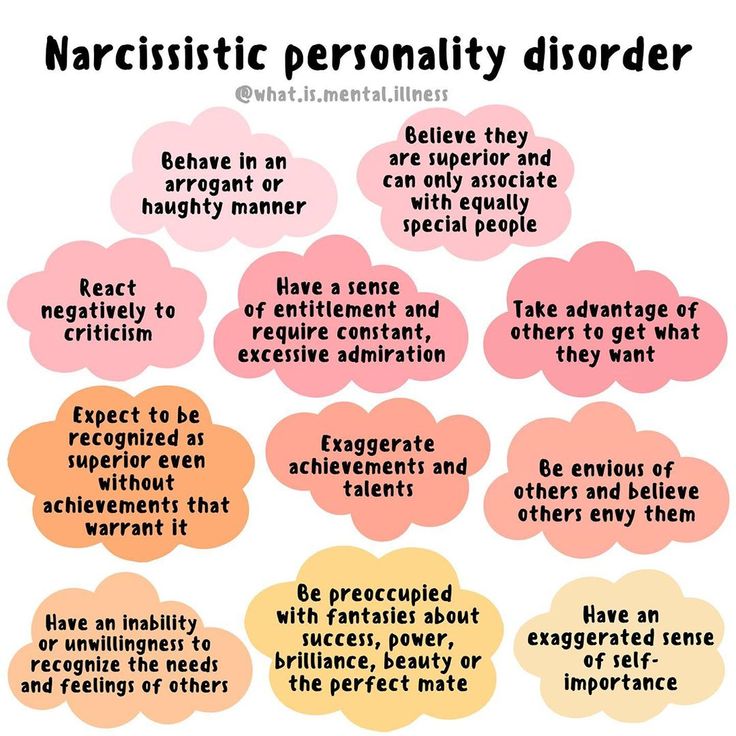
How to overcome childhood trauma
The third part of his book McBride devotes entirely to the process of recovery. She provides many exercises that can help you accept and live through traumatic experiences, and also recommends contacting a psychotherapist. The specific steps to recovery for the daughters of narcissistic mothers are:
- Embrace the limitations and feel the grief of not having the mother you dreamed of.
- Separate psychologically from the mother and reformulate the negative beliefs received from her into positive ones.
- Accept your own feelings, desires and personality.
- Learn to communicate with your mother in a new, more environmentally friendly way.
- Learn to recognize your own narcissistic traits and decide not to pass on this emotional legacy to your children.
- Teach yourself to grieve.
In twenty-eight years as a psychotherapist, McBride has noticed that most people try to skip the last step. This is quite expected, because breaking through denial and feeling pain is incredibly difficult. Meanwhile, mourning is the most important step that plays a decisive role in the process of change.
It starts with one decision: you allow your feelings to be. This needs to be learned, especially if you have been told all your life to shut up, not to grunt or not feel anything, to lie and pretend that everything is in order when in fact it is not.
You can try to rationalize the pain by thinking, "I shouldn't feel this way" or "It wasn't all that bad." It won't help. Whatever emotions you experience, it is important to let them be. Sometimes this will require being alone in silence. It is important to live without being distracted and without becoming dependent on work or any other that drowns out emotions.
Take time to be alone and grieve. Do this several times until you begin to feel relieved.
Let the emotions leave the body at their own speed. To do this, you can stay at home alone, take long walks, run, go to the mountains, drive or sit in a coffee shop. Find what is comfortable for you.
During the mourning process, you will go through five stages: acceptance, denial, bargaining, anger, depression. It is important to go through them all and finally accept the fact that your mother is really narcissistic and did not give you the love that you wanted and needed. Only then can you truly live the grief.
For effective mourning, McBride recommends:
- Keep a diary. It symbolizes a serious attitude towards recovery. Writing down feelings is another way to let them go. Keeping a diary provides an opportunity to free yourself from trauma.
- Do not listen to other people's opinions while you are in this process. With the best of intentions, friends and relatives will say something like: “Yes, forget about it already”, “You cannot change the past, stop trying” and “Stop thinking about the past, live here and now.” They don't understand that if you don't face your sadness, it will stay with you forever.
- Let the guilt be. Guilt will inevitably come. McBride notes that in almost every clinical session and every interview, the daughters of narcissistic mothers admitted that they were uncomfortable because they talked about their mothers in a negative way. This is a cultural taboo that will have to be overcome in order to heal from trauma.
- Grieving for the little girl you failed to become because you had to take care of your mother early, and sometimes the whole family.
How to communicate with your mother in recovery
At this stage of healing, it is important to explore ways to manage your relationships and maintain the ability to behave in a healthy way. You have changed, but your mother has not.
McBride argues that in full blown narcissistic personality disorder there is little chance of effective treatment or change. The desire to change is important here, and narcissistic clients, when contacting a therapist, try to quickly find answers to questions about how to interact with other people. They do not assume that the problem may be in themselves, and quickly leave, believing that something is wrong with their therapist.
The narcissistic mother can be too toxic, so it is important for the daughter to make the decision to break contact with the mother during recovery.
Others may not understand this decision, but you are making it for your mental health. If the mother is unable to change and you are constantly attacked and insulted by her, it is important to understand that cutting off contact with her is the healthier solution.
Due to the rarer communication, your contact will become polite. It is important not to expect anything from the mother, then you will experience less disappointment. McBride elaborates that this schema works best after you complete the healing process by accepting your mother's limitations and truly separating from her.
How to forgive your mother and is it necessary?
You do not have to wait for your mother's approval by moving away from her during therapy. If she does not leave you alone, you will have to learn to set personal boundaries. “Be clear about what you will and will not do,” McBride writes.
Many people are afraid to declare their boundaries because they worry about the feelings of others. Daughters are also often afraid to install them because mothers might get angry. This fear is very real, as narcissists often cut people out of their lives.
It is important to understand that the mother has already left you emotionally, there is not much she can do to harm you on a similar scale. come to you for dinner on Sundays. I need to be alone and I won't call you. When I'm done, I'll let you know. You don't need to call me for a while unless absolutely necessary. I'm not angry, and all this has nothing to do with you. It's just what I need right now." The mother may ask if everything is all right with you, and you can emphasize that everything is fine with you and you are not angry with her.
It happens that the mother keeps calling, coming to your house, manipulating. “Your task is to keep the boundaries and not react after you have informed her about it. She rings the doorbell, you don't open it. She calls on the phone, you don't pick up. She speaks to you, you once again confirm the seriousness of your intentions. How she handles this situation is her problem, not yours. You are not responsible for her feelings. You can act kind and gently remind her that you will start communicating with her again when you are able to do so.
Many are taught from childhood that good girls forgive and forget insults. We are expected to forgive everyone who offends us, because it is right. McBride emphasizes: “Forgiveness has a positive charge and helps in healing if we see that the person did not wish us harm. However, trying to deny the pain we have experienced will not do any good. Moreover, by refusing to admit that we have been harmed and to understand that a person may well do it again (intentionally or not), we put ourselves at risk.
Many misunderstand forgiveness as an excuse for the behavior that harmed us. As if nothing terrible had happened. McBride recommends forgiving only those who are ready to accept responsibility - after the person has admitted his wrong, realized it and truly repented. The author of Good Enough advises letting go of the situation internally, which will definitely do you good: “Forgiveness comes when you live these feelings in order to move on and live your life.”
Artwork: Shutterstock (Taty Vovchek)
15 signs you were raised by narcissists and how it might affect you - The-Femme
Relationships between parents and children are often full of drama, especially during adolescence. But for some people, such as those raised by narcissistic parents, the consequences can be more severe and long-term.
According to the Diagnostic and Statistical Manual, people with Narcissistic Personality Disorder (NPD) will have at least 55% of the most common narcissistic traits, including entitlement and superiority, exaggerated need for attention and control, lack of empathy, and more. If these traits sound too familiar to you from what you experienced as a child from your parents, you may have been raised by narcissists. Here's how to figure it out, how to treat it, and how to break the vicious cycle, according to experts.
15 Signs You Were Raised by Narcissists
According to licensed psychoanalyst Babita Spinelli, these are the most common signs a narcissistic parent can show:
- They won't admit they've done wrong or made a mistake.
- They avoid talking about issues that make you anxious.
- They are not open or honest communicators.
- They tend to gaslight.
- Their love seems to be conditional, meaning that they expect perfection most of the time, and are disappointed when you fail a test, make a mistake, or somehow don't live up to their unrealistic expectations.
- They are quick to blame you when something goes wrong.
- They exude emotionally manipulative behavior, making you feel guilty or irrational when you're trying to set healthy boundaries.
- They need a lot of attention, but they rarely give you the attention you need.
- They are often more concerned with what others think than with your feelings or subjective experience.
- They dominate the conversation and prevent others from talking.
- They undermine the choices of their children (especially their adult children).
- They act as martyrs or play the victim.
- They ridicule or ignore your emotional reactions.
- They are jealous of the life you have made for yourself. This is more common in female narcissists, especially mothers towards their daughters or daughters-in-law.
- They tend to be bossy and try to force their way of doing things on you.
1. This affects your choice of partner.
According to therapist Wendy Behari, LCSW, being raised by narcissists can affect the partners you choose later in life. For example, some will try to mirror the dynamics of their growing up simply because they are only familiar with that pattern of behavior. This can lead to controlling or toxic relationships, especially if people are constantly dating narcissists.
On the other hand, those who reflect their parents' narcissistic traits as adults may choose a soft or passive partner in an attempt to control themselves, Behari says.
2. You may exhibit narcissistic behavior yourself.
When parents are narcissists, this can lead to what Behari calls a "legacy of narcissism" where the child grows up and imitates the way they were raised. "It means they act in a very authoritative, controlling and demanding manner." They can also be very critical and at the same time very sensitive to criticism, she adds.
3. You sacrifice your own sense of self.
Some adults grow up but remain in the role they played as children. “They are still extremely selfless in their relationship. Their voices, preferences, opinions, desires, dreams, etc. are suppressed, Behari says, because that is what their narcissistic parents expected of them.
4. Your inner critic is very loud.
"Narcissistic parents are often judgmental and critical," says Spinelli. "This may affect your own internal messaging." This inner critic can come out as a perfectionist and lead to self-doubt.
5. You develop an avoidant attachment style.
While some people choose unhealthy partners in response to being raised by narcissists, others may avoid romantic relationships altogether—a hallmark of the avoidant attachment style.
6. You always try to please people and cannot set boundaries.
People who grew up with narcissistic parents may feel the need to adjust to others to the extreme in adulthood. This usually happens sometimes when they need to maintain boundaries. “This is the result of not having room for your own subjectivity to grow,” Spinelli says. “Or you were made to feel guilty by a narcissistic parent.”
7. You have difficulty identifying your emotions.
"To deal with a narcissistic parent, there is often a need to dissociate for self-preservation," says Spinelli. “As a result, identifying emotions and being able to connect with your own feelings become more challenging.”
In addition, Spinelli says that being raised as a narcissist can also lead to:
- Anxiety
- Low self-esteem
- Depression
- Self-doubt
- Codependency in relationships
How to heal:
1. Understand narcissism
Behari recommends studying narcissism and its consequences. The more you do this, the more you will be able to realize that the blame or shame placed on you by your narcissistic parents was not your fault. “The more we understand it, the more we can heal,” she says.
2. Get professional support
Seek help from a licensed therapist or counselor to manage your trauma. A therapist who specializes in narcissism can also help with the first clue, Spinelli says. Professionals can help you recognize your triggers, provide the tools to overcome them, and set healthy boundaries.
Finding a trusted support group of friends and loved ones can also go a long way in restoring your ability to be vulnerable and gain self-respect.
3. Set Healthy Boundaries
Spinelli says that with the help of a therapist, you can assess the type of boundaries that will be helpful to you and then begin to implement them with your narcissistic parent. “It will take a step-by-step approach and you may face resistance from those who raised you, but keep your position on your feelings and what is non-negotiable,” she adds.
4. Mourn the loss
It can be helpful to grieve for the parents you hoped for. "It's a loss, and it's important to give yourself permission to understand and respond to it as a loss," Spinelli says.
It can also be helpful to learn how to rethink yourself and heal your inner child through what is known as inner child work.
How to Break the Cycle When You Become a Parent
After better understanding narcissism and doing the work of healing your own wounds, it is important to remember a few things in order to break the cycle and avoid the legacy of narcissism that Behari mentioned. This means doing everything in your power to ensure that your children do not have the same experience and become narcissists themselves.
According to psychoanalyst Laurie Hallman, Ph.D., one of the most important factors is that you allow your child to be separated from you.
"During the first three years of life there is a stage of child development called separation-individuation," Hallman writes in his book Are You Living with a Narcissist? “This is when the child has to work out his need to feel close to an admiring mother, and also develop a healthy separation where he can tolerate the fact that he is not omnipotent and grandiose.” In other words, let your child develop their own personality apart from you and feel safe doing it.
At the same time, it is important for parents to set limits, especially if they are worried about raising a future narcissist. Some parents find discipline difficult, especially those who are used to pleasing people as a result of being raised by narcissistic parents.













